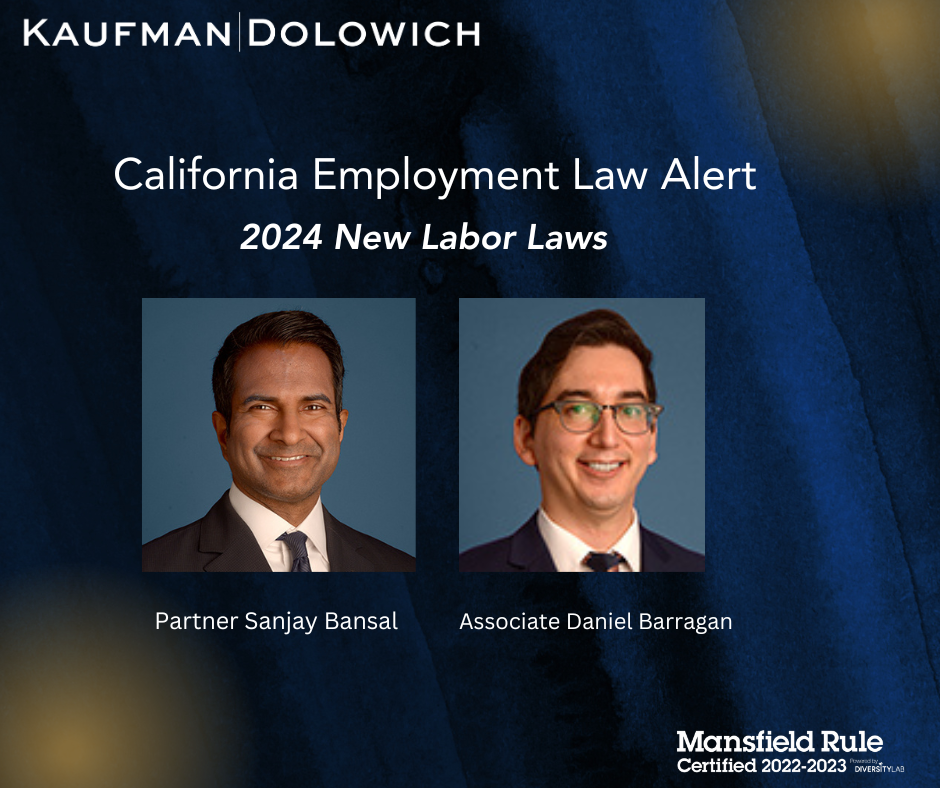Kaufman Dolowich Law Alert: California 2024 New Labor Laws, by Sanjay Bansal, Esq. and Daniel Barragan, Esq., 11-15-2023
California employers should start preparing for a variety of new employment law obligations that go into effect in the New Year as a result of recent legislation signed by Governor Gavin Newsom. To help assist employers with compliance, below is an overview of each new law and some key considerations.
New Reproductive Loss Leave Requirements
Effective January 1, 2024, Senate Bill 848, makes it an unlawful employment practice for employers with more than five employees to deny eligible employees up to five days of reproductive loss leave following a reproductive loss event. A reproductive loss event includes instances such as failed adoption, failed surrogacy, miscarriage, stillbirth, and unsuccessful assisted reproduction. Employers must grant this leave within three months of the event, allowing nonconsecutive days if necessary, and if an employee experiences multiple reproductive loss events within a year, the total leave granted should not exceed 20 days in a 12-month period.
Furthermore, employers should be aware that this law also prohibits retaliation against employees exercising their right to reproductive loss leave or providing information related to this leave. Employers are obligated to maintain confidentiality regarding employee requests for reproductive loss leave, ensuring that any information provided is kept confidential, disclosed only to internal personnel or counsel as necessary, or as required by law.
In light of these changes, we strongly advise all employers promptly review and update their policies to comply with this new legislation. Familiarizing yourself with the specifics of the law and ensuring your organization’s policies align with these requirements will help maintain a supportive and respectful workplace environment for all employees.
Understanding California’s New Workplace Violence Prevention Regulations
California has implemented Senate Bill No. 553, which introduces new comprehensive workplace violence prevention obligations for virtually every employer. Effective July 1, 2024, this legislation mandates that all employers establish, implement, and maintain a robust workplace violence prevention plan.
This plan should be easily accessible to employees and detail responsibilities, incident reporting procedures, and training provisions. Employers must provide initial training to their workforce when establishing the plan and subsequently conduct annual training sessions. Additional training is also required when new hazards emerge or adjustments are made to the plan. The legislation requires the maintenance of records pertaining to hazard identification, corrective measures, and training sessions for specific periods. Importantly, records related to hazard identification, training sessions, and violent incident logs must be maintained for inspection by Cal/OSHA and should be made available to employees and their representatives upon request.
Employers should act swiftly to familiarize themselves with the legislation and create a comprehensive written plan, conduct necessary employee training, and maintain records. Not adhering to these requirements may lead to citations and penalties.
Off-Duty and Away-From-Workplace Use of Cannabis Discrimination
California Employers should take note that Assembly Bill No. 2188, is set to change the landscape of employment regulations in the state. Starting January 1, 2024, it will be unlawful for employers to discriminate against individuals in hiring, termination, or any employment terms based on their off-the-job and away-from-workplace use of cannabis. The law acknowledges that traditional drug tests, which often detect non-psychoactive cannabis metabolites, do not necessarily indicate impairment on the job. Therefore, employers are prohibited from penalizing employees based solely on the presence of these metabolites. However, preemployment drug screenings that use scientifically valid methods excluding non-psychoactive cannabis metabolite screening are permissible under the new legislation.
It is crucial for employers to understand that while this law protects employees’ rights to use cannabis recreationally off-duty, it does not grant permission for employees to be impaired or use cannabis while on the job. Employers maintain their rights to enforce drug and alcohol-free workplaces as outlined in existing laws. Additionally, certain exemptions apply, including employees in the building and construction trades and those in positions requiring federal background investigations or security clearances.
This development highlights the importance of staying informed about evolving employment laws and adapting workplace policies accordingly. Employers are encouraged to review their drug testing procedures and make necessary adjustments to comply with the new regulations, ensuring a fair and discrimination-free work environment for all employees.
Changes in California’s Non-Compete Agreements
Assembly Bill No. 699 and Assembly Bill No. 1076, have been enacted, significantly altering the landscape of non-compete agreements in California.
Senate Bill No. 699, effective immediately, establishes that any contract void under existing law is unenforceable, regardless of where and when it was signed. Employers are expressly prohibited from attempting to enforce such contracts, even if signed and maintained outside California. Additionally, it’s now illegal for employers to enter into contracts with employees or prospective employees containing provisions void under this law. Violation of this law constitutes a civil offense, with employees having the right to seek injunctive relief or actual damages through private action. Notably, prevailing employees are entitled to recover reasonable attorney’s fees and costs.
Furthermore, Assembly Bill No. 1076, effective immediately, broadens the prohibition on non-compete agreements in the employment context. Any non-compete agreement, no matter how narrowly tailored, is void unless it falls within specific exceptions outlined in the chapter. For current employees and former employees who were employed after January 1, 2022, employers must notify them by February 14, 2024, if their non-compete agreements are void. This notification must be individualized, delivered to the last known address and email address of the employee. Failure to comply constitutes unfair competition.
Employers are strongly encouraged to review and update their policies and contracts, ensuring they comply with these new regulations. It’s vital to be aware of the February 14, 2024, notification deadline. Failure to do so may result in legal consequences.
Kaufman Dolowich Can Help
With the host of new laws on the horizon in the coming year, employers need to be mindful of their pending new obligations. If you need assistance navigating any of these new laws, our team of skilled labor and employment attorneys can help.











